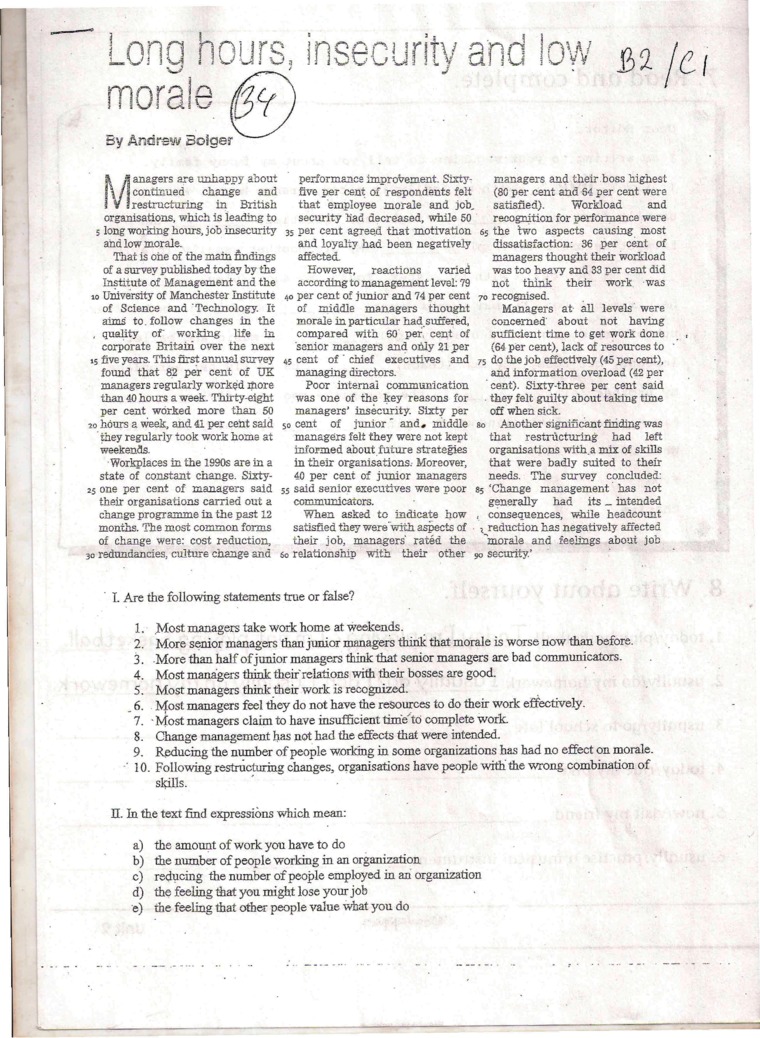46452


inseeurity and Iow 32
Managers are unhappy about coutlcued change and restructuring in British organisations, which is leading to $ long working hours, job inseeurity and Iow morale.
That is one of the mam findings of a survey published today by the Institute of Management and the to University of Manchester Institute of Science and Technology. It ąims to follow changes in the . ąuality of working łife in corporatc Britaiń over the next »s five years. This flrst annual starcy found that 82 per cent of UK managers regularly worked morę than 40 hours a week. Thirty-eight per cent worked morę than 50 10 hóurs a week. and 41 per cent sald ihey regularly took work homa at weekends.
Workplaces in the 1990s are in a State of constant change. Sixty-15 one per cent of managers sald their organisations carried out a change programme in the past 12 months. The most common forms of change were: cost reduction, y> redundancies, culture change and
performance improkement. Sucty-five per cent of respondents felt that employee morale and job, security had aecreased, winie 50 3s per cent agreed that motlvatlon and loyaliy had been negatively affected.
However, reactions varied according to managernent level: 79 40 per cent of junior and 74 per cent of middle managers thought morale in particular had suffered, compared wita 60 per cent of senior managers and ońly 21 per 45 cent of chief executives and managlng directors.
Poor interna! communication was one of the key reasons for managers' inseeurity. Slarty per so cent of junior' and# middle managers felt they were not kept informed about futurę strategies in their organisations. Moreover, 40 per cent of junior managers 55 said senior executives were poor communlcators.
When asked to in di ca te how satisfied they were’with aspects of their job, managers rated the so relationship with their other .
managers and their boss highest (80 per cent and S4 per cent were satisfied). Workload and reeognition for performance were the two aspects causing most dissatisfaction: 36 per cent of managers thought their workload was too heavy and 33 per cent did not think their work was . recognised.
Managers at all levels were coacemed about not having sufficient time to get work done (64 per cent), lack of resources to do the job e£fectlvely (45 per cent), and Information overload (42 per cent). Sixty-three per cent said they felt guilty about taking time off when sick.
An other signiScant finding was that restnlcturing had left organisations with.a mix of skills that were badly suited to their needs. The survey concluded: 'Change managernent has not generally had its _ intended conseąucnces. while heaacount t reduction has negatively affected 'morale and feelings about Job security.’
L Are the following statements true or false?
1. Most managers take work home at weekends.
2. Morę senior managers than junior managers think that morale is worse now than before.
3. Morę than half of junior managers think that senior managers are bad communicators.
4. Most managers think their relations with their bosses are good.
5. Most managers think their work is recegnized.
6. Mosl managers feel they do not have the resources to do their work effectively.
7. Most managers claim to have insufficient time'to complete work.
8. Change managernent has not had the effects that were intended.
9. Reducmg the number of people working in some organizations has had no cffect on morale.
10. Following restructuring changes, organisations have people with the wrong combination of skills.
II. In the text find cxpressións which mean:
a) the amount of work you have to do
b) the number of people working in an organization
c) reducing the number of people employed in an organization
d) the feeling that you might lose your job
e) the feeling that other people value what you do
Wyszukiwarka
Podobne podstrony:
00404 ?42ec37fc4cd13c2480fd62b55231c6 408 Pignatiello & Ramberg by a single niunber. In situati
Management, Enterprise and Benehmarking- In the 21ST Century 2014 • Budapest, Hungaiy performance (3
1 12 Trade negotiations are not about selling and buying, but seeking an agreement, tim ing to fit t
86924 WELCOME 1 ĆWICZENIA 51 CEEB1EB3I1 7 Listen and tick (/) the animals they are talking about.
Back “łt is the passion of absolute belief, the burden of doubt that [Bova and Austin] are writing a
key0004 2. Reading A You are going to read a magazine article about an English woman living in Paris
Slajd16 6 State and localgovernment In Qatar, television camera s are being inserted into water and
m854 Wiiliam’s siege of Dinant, as shown in the Bayeux tapestry. The Normans on the left are obvious
File0011 I tan talk. about sports I likc. 1 klilMMIfri Work in pairs. Ask and answer the questions.
Learning in this course You are expected to attend aH lectures, tutorials, and labs in order to maxi
image027 xj m. Results Display B U a I 1 II po ZI The default font and si2e in the display be
image033
image034 m. Results Display B 7 U iii The default font and si2e in the display below are Cou
vening years; for this issue ihey are $600. $1,000, and $1,500. In a sense, i hal poses a tough
więcej podobnych podstron